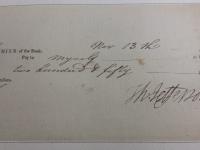“Who dignifies his Wealth by gen’rous Use, / To raise th’Oppress’d, or Merit to produce, / Reason’s impartial Voice shall ne’er condemn, / The glorious Purpose of so wise an Aim.” - Benjamin Franklin
Political scientists have long been interested in the study of money and politicians: Consider all the talk about “revolving doors,” “iron triangles,” and campaign finance reform. Historians can weigh in on these issues while taking into consideration the ways in which money influenced the Revolutionary generation.
In this lesson of lecture and discussion, students may confront questions relevant to the past and the present, including: What role does money play in the American democracy today? What did our Founding generation of Americans think about connections between business and government? In what ways do Americans want politicians to be savvy and worldly?

